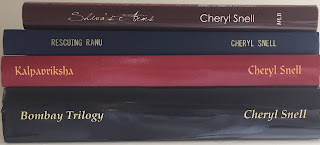RSS
RIP
My sister was many things. A galaxy of ideas. An exultation of creativity. The radiance of hope. And now, the source of all sorrow.
Reading Group Questions for Bombay Trilogy
The overarching subject of Cheryl Snell's Bombay Trilogy is the meaning of home, and how we navigate the intersection between duty and individuation. The theme of the concluding third volume, Kalpavriksha, narrows in on the nature of kinship. The following are questions for discussion:
T
he novel opens with the Sambashivan family meeting for a wedding between a Bollywood bride and a favorite son of the family. The union is joyously received, unlike the marriage two generations earlier between Ramesh and the American Alice. How did the Brahmins alter their strict codes of proper behavior in order to accept Lalith’s profession? Is caste more important in the Sambashivan clan than traditional values? Developing the exploration of caste from another angle, Ram meets his student Anand on the street outside the wedding hall. The boy is a Dalit, an Untouchable, and
immediately suffers an incident of casual racism at the hands of Ram’s brother.
.More cruelty follows in a sequence of events that has Anand’s father paying
the ultimate price of being shunned. However he leaves a revelation for his son
that changes the young man’s identity
and could ease his burdens. Did this storyline remind you of the current status
of race relations in this country?
Nela and Ramesh overcome the coolness between them to band together at the hospital where Anand has taken his father. How do siblings’ respective roles in the family change over time, especially when one member exceeds the entire family’s expectations as spectacularly as Nela has?
The brother and sister are accompanied to the hospital by Nela’s adopted daughter Ranu. She is considered a goddess in her village for her ability to emotionally heal people, although she herself is not whole. She has a deformed leg. That’s enough reason for some of her relatives to consider her unmarriageable. So, when she and Ram and Alice’s son Sam upstage the bride and groom by announcing their own engagement, these relations are aghast. Does that reaction have more to do with Ranu being adopted (her caste unknown) than her physical imperfection?
A recurring motif in Kalpavriksha has to do with freedom and how far the characters go to get it. Marriage that benefits the joint-families involved is one way. Geographical distance is another. Ram, Nela, and Sam all go away to college where they can hear their own voices above the din of the genetic collective, Reconfiguring the idea of family is still another way --who will we allow into our inner circle, based on what criteria? It’s not always blood. For instance, Ram’s central conflict is resolved when he takes Anand under his wing; Nela uses her fame to rescue her imprisoned husband; and Alice accepts her status as an outsider by using her art to record the truth of the family’s interactions. These are novelistic solutions to problems developed within the text, but in real life, how have you reconciled independence and duty?
Janet Snell's Page
Gifts Received
Janet Snell has not received any gifts yet
Profile Information
- Provide your FULL Website including http and .com :
- http://snellsisters.blogspot.com
Janet Snell's Videos
-
aura
Added by Janet Snell 0 Comments 0 Likes
-
idea
Added by Janet Snell 0 Comments 0 Likes
-
Stumble
Added by Janet Snell 0 Comments 0 Likes
© 2025 Created by COS Productions.
Powered by
![]()







Comment Wall
You need to be a member of Book Trailers to add comments!
Join Book Trailers